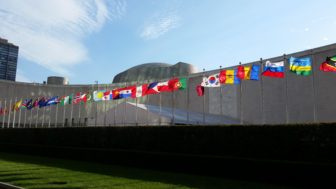Tag: MLAT

Four ways the new proposal for bypassing MLATs fails human rights
We need to fix the MLAT system, but the new proposal doesn’t really do that. It also fails to implement a true human rights framework.

Beyond connectivity: building an inclusive U.N. agenda for internet development
On Monday, October 19th, stakeholders in the World Summit on the Information Society (WSIS) process gathered in New York for an interactive summit that represents one of the last few chances for civil society to discuss the WSIS findings and help shape the future of the initiative. Access Now joined a diverse coalition of groups to submit a unified revision of the “zero draft” — the draft of language that will become the resolution for adoption by the U.N. General Assembly in December.

The dangers of a militarized internet
Global conversations on cybersecurity, particularly in the west, have been largely focused on securing critical infrastructure. This nation-state-level focus has, perhaps unsurprisingly, implicated the military in defending a country’s national borders and national infrastructure, with “cyber” now joining air, land, sea, and space as a 5th domain of military warfare. To maintain the spirit of the Universal Declaration of Human Rights in the digital age, nations must now advance a user-focused approach to cybersecurity.

The U.S. must respect the rights of all users
The U.S. government believes that those who are not in the U.S. or who are not U.S. citizens or permanent residents — “non-U.S. persons” in official parlance — have few to no privacy rights to protect them from U.S. surveillance. Access provides four policy recommendations that would start the U.S. on a course towards respecting the human rights of all people.
Access, Partners Recognize Heroes, Villains on Human Rights and Communications Surveillance
Individuals around the world work to advance, undermine Principles
The urgent need for MLAT reform
The process for sharing criminal investigation information between countries is broken: official exchanges between nations are slow, underfunded, and lacking in user protections. Human rights are at risk.
Access launches MLAT.info
Access launched www.mlat.info, a website that makes it easy to explore the text and geographical scope of Mutual Legal Assistance Treaties (MLATs).
MLAT: a four-letter word in need of reform
One of the many recommendations in the President’s Review Group report on the NSA surveillance programs released last month was for the review of MLATs, or Mutual Legal Assistance Treaties. This was the second time that MLATs made the news in December: at the beginning of the month, eight major internet companies issued a series of principles for reforming government surveillance that including improving the MLAT system. Clearly MLATs are an issue, but what does this four-letter word mean, and why are they so desperately in need of reform?
Access statement on the President’s Review Group report on NSA surveillance
This afternoon the White House released “Liberty and Security in a Changing World,” the report and recommendations of the President’s Review Group on Intelligence and Communications Technologies. This five-person task force was convened by President Obama to assess the NSA’s communications surveillance programs and provide recommendations on reform.
Access welcomes internet companies announcement in fight for surveillance reform
This morning eight major internet companies — AOL, Apple, Facebook, Google, LinkedIn, Microsoft, Twitter, and Yahoo! — issued a broad and powerful call for surveillance reform. The joint statement represents the strongest stance yet by U.S. internet companies on government surveillance and has the potential to shift the debate in Washington.